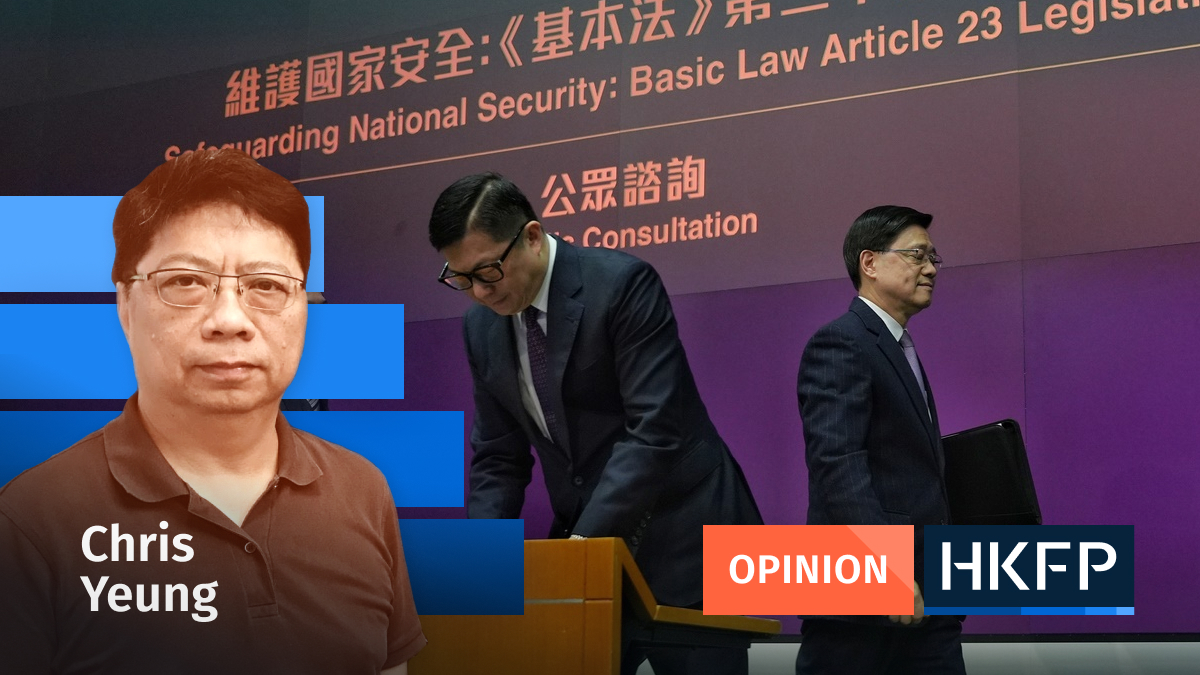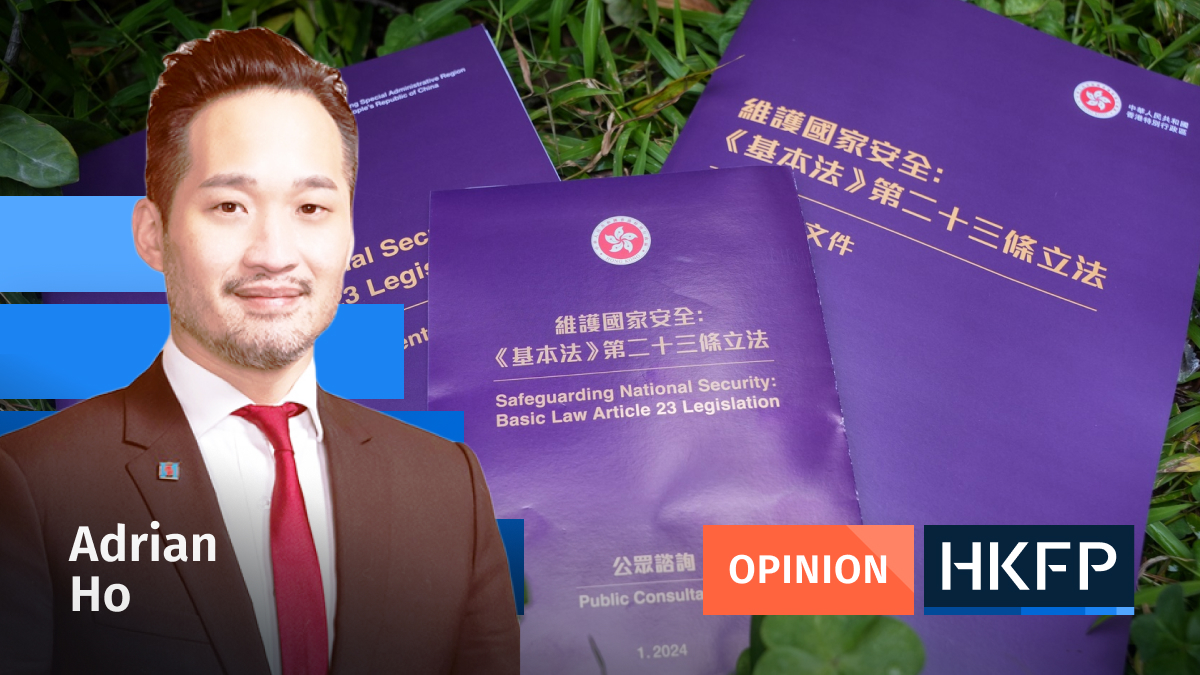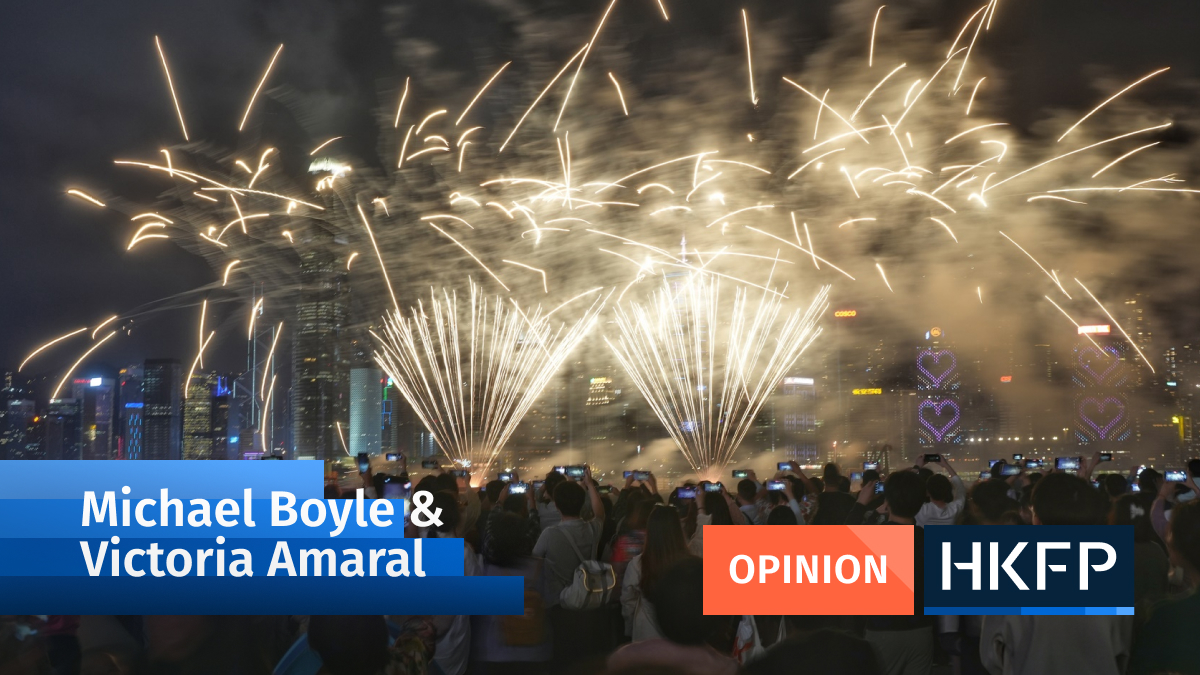Hong Kong’s 2020-2022 election cycle will end with the selection of the chief executive, a post equivalent to the governor in colonial days, but far less powerful. This final step was originally scheduled for March 27, but has been pushed back to May 8, with the pre-election nomination period to run from April 3 to 16.
The dates could be pushed back further still due to the unexpected post-Lunar New Year surge of Covid-19 – led by the Omicron variant – that has finally humbled the local health authorities’ much vaunted contact-tracing routines. Until now, for reasons not yet clear, Hong Kong was able to escape the surges that have overwhelmed medical facilities and mortuaries in countries around the world.

Death of one dream in pursuit of another
Hong Kong’s political dreams and aspirations were about the promised “genuine” Western-style one-person, one-vote universal suffrage elections. Or at least that’s what everyone thought had been promised. This step was supposed to have been achieved first for the chief executive, and then for the city’s legislature.
Hong Kong’s chief executive was not to be outshone by the Legislative Council (LegCo) in what Beijing decreed must remain an “executive-led” system, as it was under British colonial rule. For Beijing, it was a convenient inheritance. But for Hong Kong it didn’t seem like an even trade. The British colonial version was not seen in quite the same light as its Communist Party counterpart.
The sequence was prescribed by Beijing in recognition of the added authority a universal suffrage election, with its popular mandate, would bestow upon the chief executive. The point about Western-style election mandates was not lost on Beijing’s Communist Party decision-makers, even though their elections have never enjoyed such a popular mandate. For them it is the party’s job to represent the people.
Still, Hong Kong’s dream was acknowledged by the central government and had persisted since the 1980s, when Beijing wrote the promise into Hong Kong’s new post-colonial Basic Law constitution. It was promulgated in 1990, for use after the city’s 1997 return to Chinese rule. Beijing decision-makers also stood by for decades while Hong Kong’s new democracy movement pursued its quest – from the 1980s through the disruptive 2019 street protests.
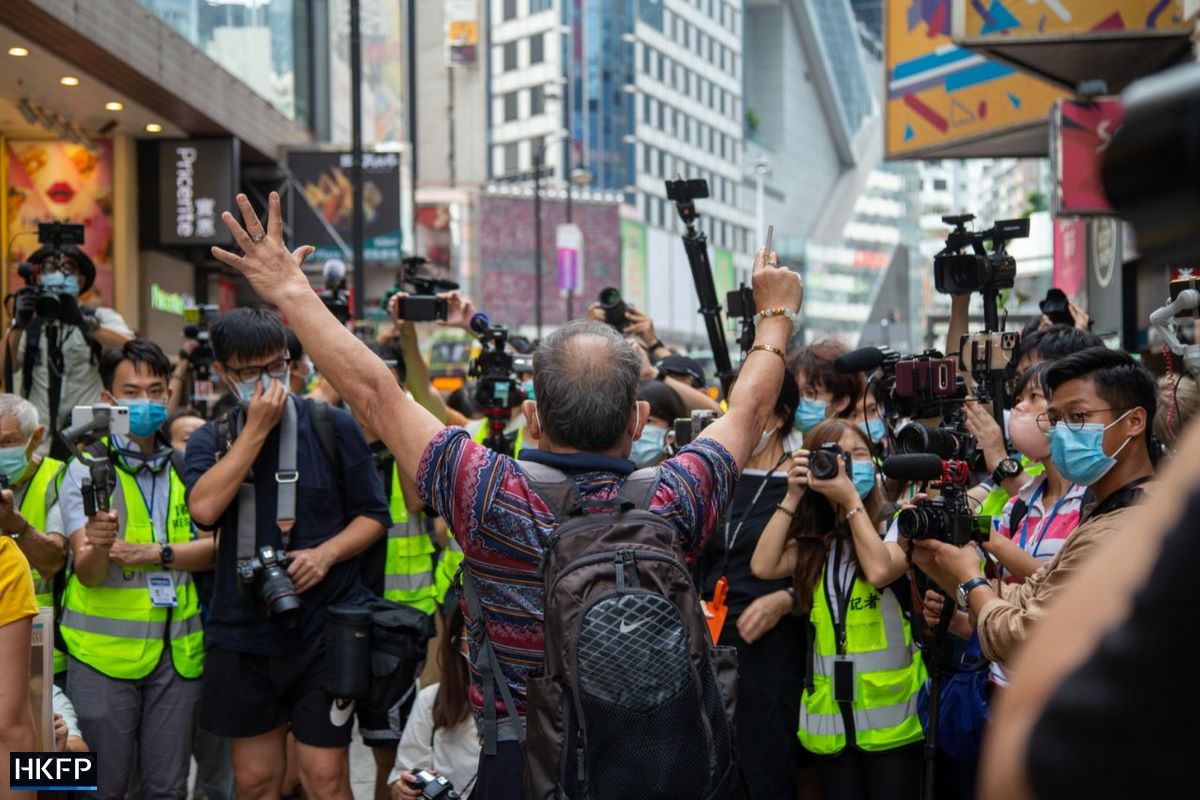
By then, universal suffrage had become one of protesters’ “five demands, not one less” rallying cry. The five demands featured in the joint political platform adopted by almost all pro-democracy candidates in the November 2019 citywide election for 18 District Councils that democrats won in an unprecedented landslide.
Universal suffrage also underlies the popular slogan, “Reclaim Hong Kong, Revolution of Our Times,” that morphed during the summer of 2019 into “Liberate Hong Kong, Revolution of our Times.” The challenge suddenly began appearing everywhere: printed on banners for use in street demonstrations, shouted out as nighttime chants from the open windows of high-rise buildings, and scribbled as graffiti on walls all over town.
From then on, the dream confirmed Beijing’s suspicions that what protesters were actually demanding was an escape from the strictures of central government rule. In Beijing’s eyes that could only mean independence.

Actually, not many were daring enough to go that far. But in Beijing’s eyes, they were all the same. Officials began saying so in 2019 and they are still saying so. Hong Kong’s democracy movement, insists Beijing, aimed to ignite another “colour revolution” like those proclaimed by the satellite countries that broke free from the old Soviet Union during its dissolution from 1988 to 1991. Beijing is still shadowed by the way the original communist project ended and continues to cast Hong Kong’s democracy movement in that light.
Beijing views the self-governing island of Taiwan in the same way, as a threat to the integrity and coherence of a reunified Chinese nation that was torn apart by the rebellions and foreign intrusions of the 19th and 20th centuries. Only the discipline of the Communist Party can prevent the recurrence of such a calamity.
But Beijing’s formula for Taiwan’s return is the same “one country, two systems” model that Hong Kong was promised, and still without the distinctions between Western and mainland forms of democracy that Hong Kong has had to piece together the hard way. Beijing has never mentioned whether Taiwan will be forced to undergo the same learning process.

Unlike Hong Kong, Taiwan has been self-governing since 1949 and has evolved into a fully functioning Western-style democracy. Beijing has yet to retract its long-standing threat to regain sovereignty over Taiwan by force of arms, if it continues to resist returning voluntarily to the embrace of the motherland.
When Beijing first began articulating the threat decades ago, people in Taiwan liked to joke that Beijing officials were too old-fashioned – they seemed not to know that forced marriages had gone out of style.
China’s current paramount leader, Xi Jinping, evokes the goal of Taiwan’s return in grand historic manifest destiny terms – something intended to evoke memories of pre-modern imperial China’s unchallenged supremacy. People here liked to joke that Xi and former US president Donald Trump shared the same dream: to make their countries great again!
Hong Kong’s democracy movement had always centred on the demand for Western-style universal suffrage elections and the Basic Law promise for a “high degree of autonomy.” This is the combination that Beijing now insists is a demand for independence.
Hence Beijing had no better means of destroying the movement than to revamp Hong Kong’s electoral designs with the aim of making these demands impossible to achieve. That meant bringing the system more firmly under Beijing’s direction and control, in an effort to snuff out the aim of an autonomous elected local government once and for all.

Since the imposition of its new national security law on June 30, 2020, Hong Kong’s post-1997 election system has been completely revamped. The goal: to ensure that only those who embrace Beijing’s political definitions and designs can claim seats in LegCo and in the newly expanded Election Committee responsible for endorsing chief executives.
These new designs were announced and promulgated by Beijing in March, last year. The redesigned Election Committee and Legislative Council were elected under the new rules on September 19, and December 19, respectively.
Both elections were delayed and rescheduled in order to accommodate the revamp. Scheduling was supposed to have returned to the original track on March 27 this year with the chief executive selection formalities. These have only been delayed now due to the sudden public health emergency.
The new order will be complete with the installation of a new chief executive, selected in accordance with the new procedures. Once accomplished, this final step will mark the culmination of Beijing’s determination to see Hong Kong’s democracy movement dead and buried, once and for all.

Its replacement is a political system populated entirely by what Beijing calls “patriots,” or loyalists tried and true. This should be easy enough to accomplish since the new Election Committee elected last September has only one “non-pro-establishment” member, Tik Chi-yuen, representing the social welfare constituency.
A new-style chief executive election
The selection of Hong Kong’s next chief executive will be formalised by the votes of half the members of the new Election Committee. Its membership was formalised by the September 19 election last year. With a full complement of 1,500 members, it’s an expanded update of the old 1,200-member committee.
This new version, like the old, is produced by a small-circle electoral process among various occupation-based Functional Constituencies. In years past these electors were entirely Hong Kong-based. The new committee has been augmented by a number of participants with affiliations to mainland China as well.
According to the election rules announced by Hong Kong’s Electoral Affairs Commission on January 27, the winning candidate for chief executive must receive more than 750 votes from the Election Committee. 750 votes from this 1,500-member committee are required to elect a leader, although there are actually only 1,462 actual people involved. This is due to the practice of concurrent positions with the same person sometimes entitled to hold more than one of the allocated positions.”
To be nominated, an aspiring candidate must receive the signatures of at least 188 Election Committee members, with at least 15 nominations coming from each of the Election Committee’s five sectors.
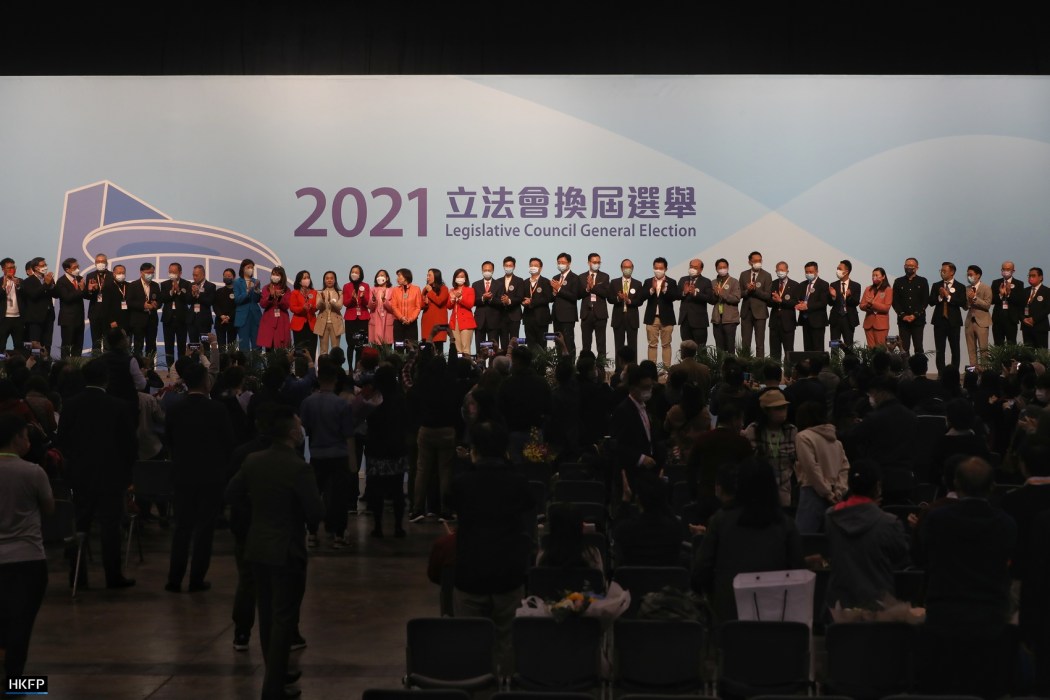
These are, sector one: business, industry, and banking; sector two: white collar, the professions; sector three: grassroots, labour, religion; sector four: Legislative Councillors and others; sector five: Hong Kong delegates to national representative bodies and other national organisations.
A thankless job
Hong Kong’s chief executive must naturally be of unquestioned political loyalty. And as the dean of local pro-Beijing politicians has explained, Beijing will have made the decision before the Election Committee goes through the motions of formalising the appointment. This confirmation of long-held assumptions came from Jasper Tsang Yok-sing during a TVB interview on December 28 last year.
Still, in years past, despite the discouraging format, there was actually a bit of politicking and campaigning for Hong Kong’s top job, and public opinion might actually have factored in as well.
But the chief executive’s role is so full of built-in hazards and trip-wires – standing as it does along the interface between the two mainland and Hong Kong systems – that none of the three men who occupied the post before current Chief Executive Carrie Lam’s tenure began in 2017, managed to complete the maximum two five-year terms allowed.

Hong Kong’s first post-1997 chief executive, patriotic shipping tycoon Tung Chee-hwa, stepped down midway through his second term, ostensibly for health reasons. Beijing’s decision to remove him in 2005, followed the Tung administration’s failure to anticipate and contain Hong Kong’s first large-scale post-1997 popular resistance movement against an attempt to pass national security legislation that reignited embers left smouldering after the 1997 handover.
Tung stood by and watched while his secretary for security, Regina Ip, probably did as much to mobilise opposition to the proposed legislation as did the campaigners themselves. Ip was the official assigned to lead the government’s promotion campaign and before it ended, she had managed to insult just about everyone associated with the protest movement.
The best protest slogan to come out of that campaign appeared on a hand-written placard that read: “SOS. Sinking ship. Save us from Regina Ip.”
The result was a defeat for the Tung administration’s 2003 attempt to pass national security legislation as mandated by Article 23 of Hong Kong’s Basic Law. Another result was the revival of Hong Kong’s pre-1997 democracy movement that had lapsed into a state of hibernation during the first five years after the handover.
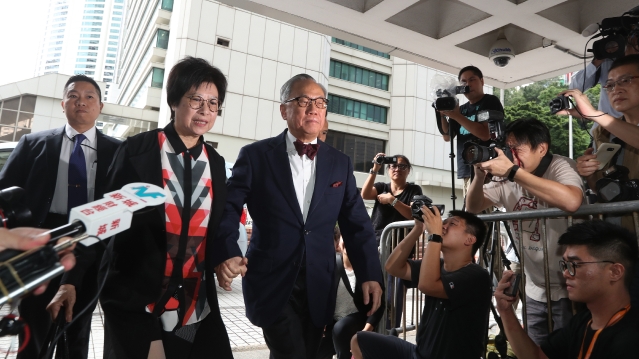
Tung’s replacement, career civil servant Donald Tsang Yam-kuen, subsequently completed a full five-year term, from 2007 to 2012. But his tenure ended under a cloud of corruption, and Tsang spent several years in prison afterward.
During his 2012 to 2017 term, pugnacious patriot Leung Chun-ying made himself so unpopular – in both pro-Beijing and pro-democracy circles – that Beijing’s decision to deny him a second term was almost inevitable.
Lam’s popularity in all circles is much like that of her predecessor. But given the disruptions here – the 2019 protests, the imposition of Hong Kong’s new national security regime, and the Covid-19 flu pandemic – she has been challenged by the toughest of political environments.
Nevertheless, “sources” here have let it be known that Beijing has taken note of her political lapses and failure to master her political brief in a way that might at least have reduced tensions instead of exacerbating them.
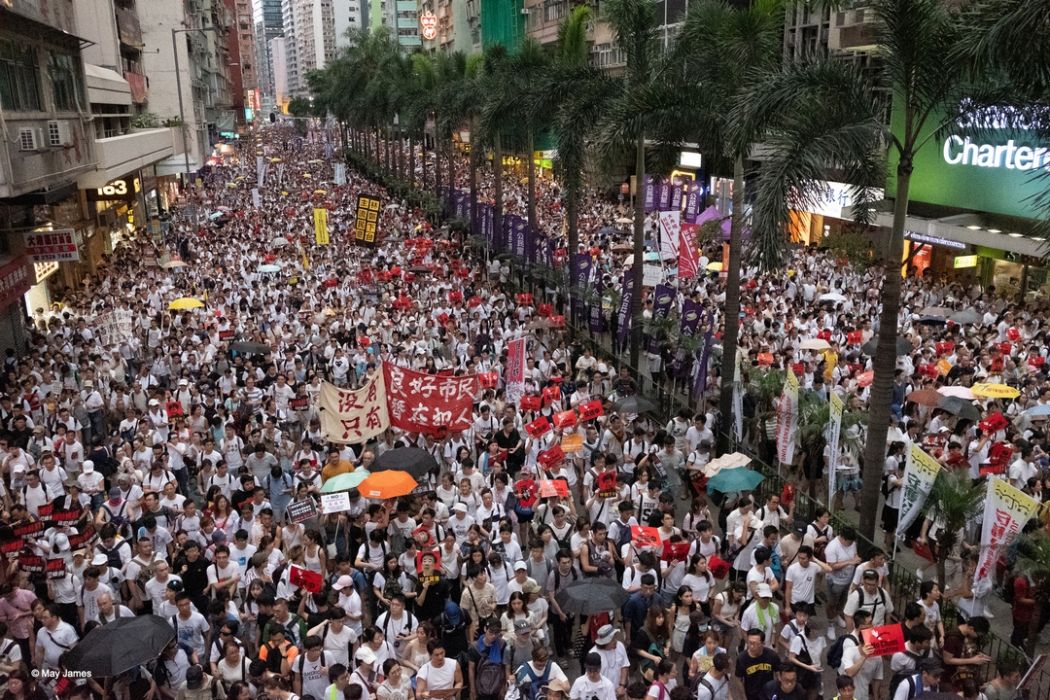
Her handling of the 2019 extradition law protests is the most glaring case in point – reinforced by her own periodic admissions that she is a political novice and knows nothing about politics! The pro-establishment camp is tired of her, the sources also say, and some of her detractors have not kept their views hidden under cover of anonymity.
As the enthusiastic enforcer of Beijing’s mandates against them, it goes without saying that her reputation among democrats of all kinds is something less than flattering. But they no longer signify.
Beijing has also let it be known, through sources, that it does not want to see an extended period of campaign competition, which is bound to create discord within the pro-Beijing camp. However restrained, candidates would not be able to present themselves in a favourable light without criticising their competitors.
Most likely, they would also not be able to resist the temptation to target the performance of Lam. In Beijing’s eyes, that would create negative impressions and darken the reputations of all concerned, thereby undermining the authority of the next chief executive.
In the interest of keeping up appearances and maintaining the authority of Hong Kong’s political establishment, competition among its leading members must be kept to a discreet minimum. The period of pre-election campaigning should be as short as possible.

Consequently, Lam has remained silent on the question of a possible second term and other potential candidates have also yet to declare. Only two have broken free from their silent ranks.
But inevitably, there are those who seem interested in joining the race just for the experience of joining the race. One is Checkley Sin, a film producer, Kung Fu Master, and online celebrity popular with fans who like his tough stands against protesters and fake news. Titus Wu Sai-chuen is a property investor who heads a club dedicated to teaching members the secrets of success. Two others are so far online candidates only: Wong Man-hong and Ahm Warm-sun.
Possible contenders
Beijing may be discouraging open competition for Hong Kong’s top job but that has not discouraged onlookers and interested parties from polite and not-so-polite speculation. People who move in the right circles have been discussing the possibilities for deliverance from Lam for at least two years.
Such discussions were prompted especially by her failure, in 2019, to anticipate and contain the public response to her extradition amendment bill. Hardliners in the pro-Beijing camp were its only fans while even conservative pro-business Legislative Councillors had reservations.
Their constituents with cross-border business interests actually stood in the forefront of those at most risk from the proposed law’s provisions – aimed among other things at suspects who commit crimes in China but can escape the long arm of Chinese law enforcement by taking a train ride back home to Hong Kong.
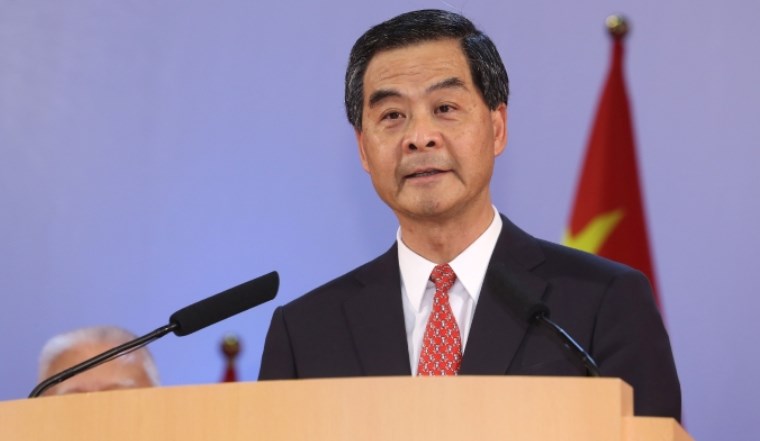
Additionally, many here are simply tired of her because she’s been around too long – as a central figure in Hong Kong’s key political controversies for a full decade. Yet she has continued to profess her innocence on matters political as though that would excuse her lapses. The combination does not inspire public confidence despite her reputation as an efficient career civil servant who knows how to get a job done.
Possibly because her predecessor, CY Leung, was not disposed to involve himself in Hong Kong’s political struggles, he designated his second-in-command, Lam, to take charge of the political reform public consultation process in 2014-15. Public consultations are a carryover from British colonial days. The underlying objective is to smooth the way for what the government planned to do in the first place, which was definitely the case with political reform.
The public consultation preceded the last-lap lead-up to what was supposed to have been Hong Kong’s first universal suffrage chief executive election in 2017. Carrie Lam was chief secretary during Leung’s tenure and had spoken about her intention to retire when it ended.
Beijing’s decision on August 31, 2014, mandating a mainland-style election format with predetermined candidates, provoked the Umbrella Movement’s street blockades that same year, and the LegCo vote to kill the 8 31 decision a year later.

After so contentious a decade, culminating in the creation of Hong Kong’s new national security regime, it seems unlikely that she herself would want to carry on for another five-year term. Hence the tea table gossip and professional pundits’ search for possible successors continues even without pre-election campaigning.
Among those thought to have the right credentials at the top of the leadership hierarchy are the “four Chans,” whose names have been circulating since early 2020. One has now declared he does not want to be considered. He is Bernard Chan, current convener of Carrie Lam’s Executive Council cabinet.
Another of the Chans is Margaret, a former director-general of the World Health Organization. Her name is still pending on the potential candidate shortlist. So is that of Norman Chan, former head of the Hong Kong Monetary Authority.
The fourth is Hong Kong’s current Financial Secretary Paul Chan. During the past year his public statements seem to have been more frequent than necessary for his position. He is also among the few top officials who have not been tarnished in the public eye as leaders among the new national security regime’s enforcers.
At least he would be a less provocative choice than the Secretary for Security, Chris Tang, who has said he does not want to be considered.

Additionally, two other possibilities are being mentioned, mainly because they themselves seem to be promoting themselves, but not because they are anyone’s preferred choice. CY Leung seems not to have accepted his status as a one-term chief executive. His name is circulating among the possibilities, and he carries on with his regular public commentaries and blog posts. Nor has he said he does not want to be considered for the 2022 to 2027 term.
Most recently Leung has become an enthusiastic promoter of Beijing’s go-north campaign – encouraging Hong Kong’s younger generation to mend their ways, learn about the mainland, and build careers there. His latest project is a full-course primary-middle school for students from Hong Kong, to open this fall in neighbouring Guangdong province.
Meanwhile, the indomitable Ip of 2003 fame spent three years immediately afterward in self-exile on the Stanford University campus in California. She devoted her time to the study of government and politics and returned to Hong Kong in a new guise. Ip transformed herself from a hardline secretary for security into a conservative pro-Beijing politician, organised her own small political party, and has won a directly elected seat in the Legislative Council since 2008.
Ip is also currently a member of the Executive Council and has twice tried to put her name forward as a chief executive candidate but failed to generate much enthusiasm among Election Committee electors. Presumably, Beijing saw little merit in the idea but for now she has not said she is interested in trying again. Nor has she said she isn’t.

Besides Bernard Chan, Jasper Tsang has also said he is not interested in the post, as have Henry Tang and John Tsang. Tang was Beijing’s first choice in 2012, until Leung succeeded in generating enough interest to displace him. That contest produced the kind of intra-elite competition that Beijing is now keen to avoid.
As for pro-democracy partisans, they too have organised campaigns in years past. In 2017, they actually found a plausible willing pro-establishment candidate in the person of former financial secretary John Tsang.
That election, in 2017, set alarm bells ringing in Beijing, due to democrats’ effort to elect more of their own kind to the old Election Committee to serve as Tsang’s electors. It was democrats’ progress then that reinforced their drive to win even more seats, in 2019, on the Election Committee, via the District Councils – because District Councillors served concurrently as Chief Executive Election Committee members!
This intricate balancing act helped bring out the voters for the November 2019 District Councils election that democrats won by a landslide, even though the election was held at the height of the protest violence. Not surprisingly, District Councillors have been removed from the revamped Election Committee and John Tsang has rejected the idea of a second run.
Correction 8/3: This article was updated to reflect that several potential candidates have expressed an interest in running the small-circle leadership election.
Support HKFP | Policies & Ethics | Error/typo? | Contact Us | Newsletter | Transparency & Annual Report | Apps
| HKFP is an impartial platform & does not necessarily share the views of opinion writers or advertisers. HKFP presents a diversity of views & regularly invites figures across the political spectrum to write for us. Press freedom is guaranteed under the Basic Law, security law, Bill of Rights and Chinese constitution. Opinion pieces aim to point out errors or defects in the government, law or policies, or aim to suggest ideas or alterations via legal means without an intention of hatred, discontent or hostility against the authorities or other communities. |
Help safeguard press freedom & keep HKFP free for all readers by supporting our team

More HKFP OPINION:
HKFP has an impartial stance, transparent funding, and balanced coverage guided by an Ethics Code and Corrections Policy.
Support press freedom & help us surpass 1,000 monthly Patrons: 100% independent, governed by an ethics code & not-for-profit.





